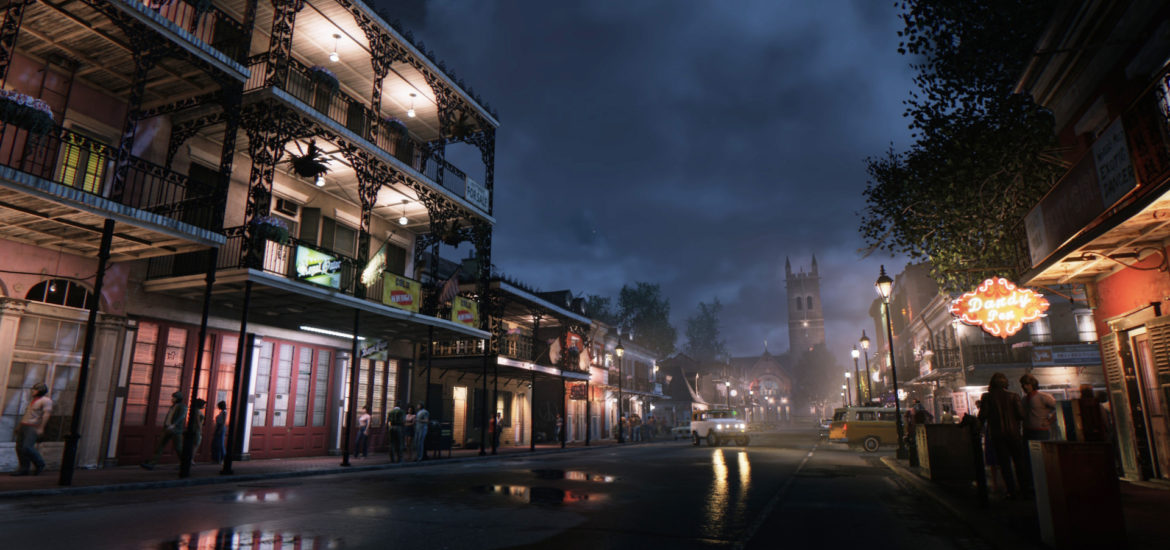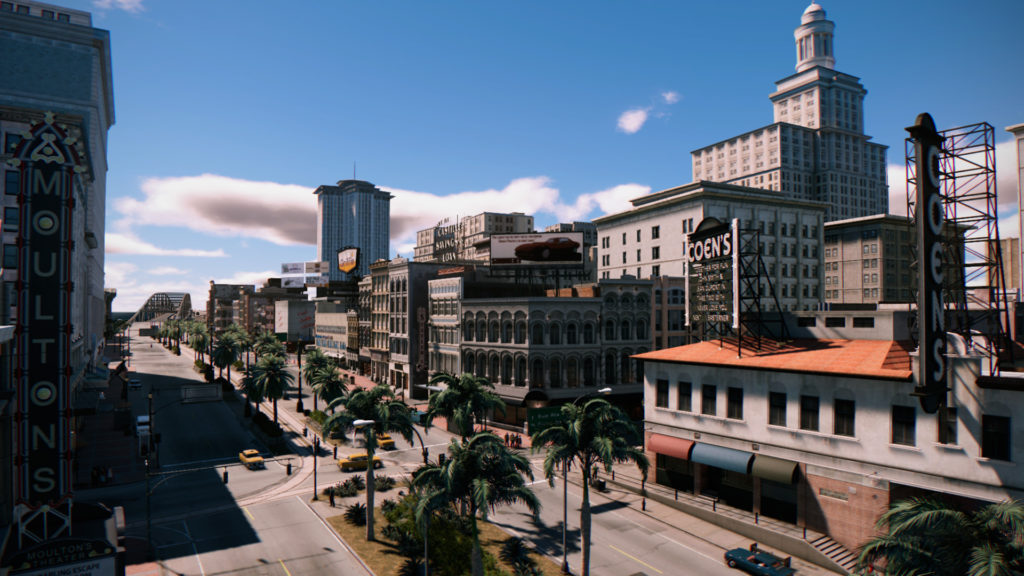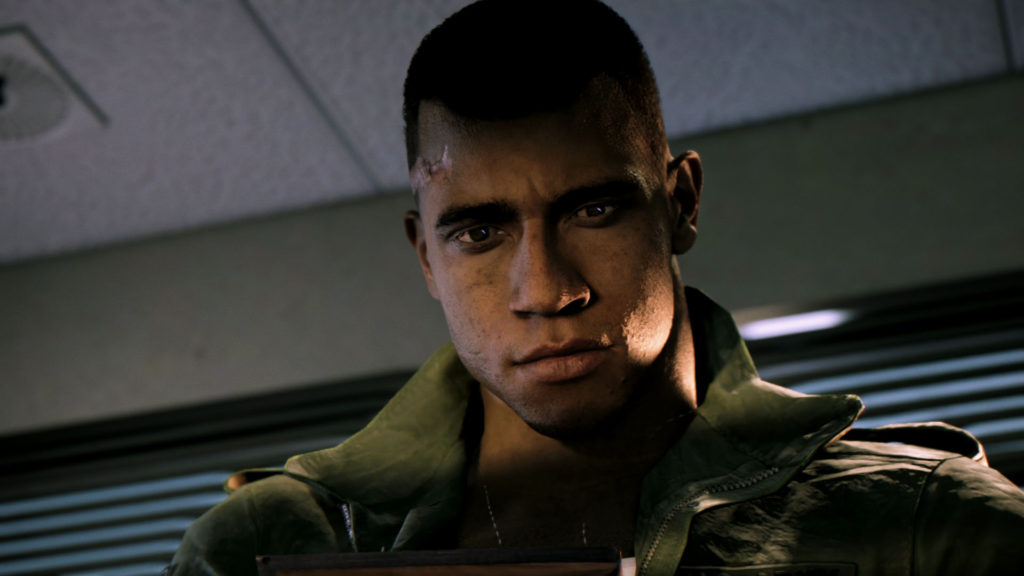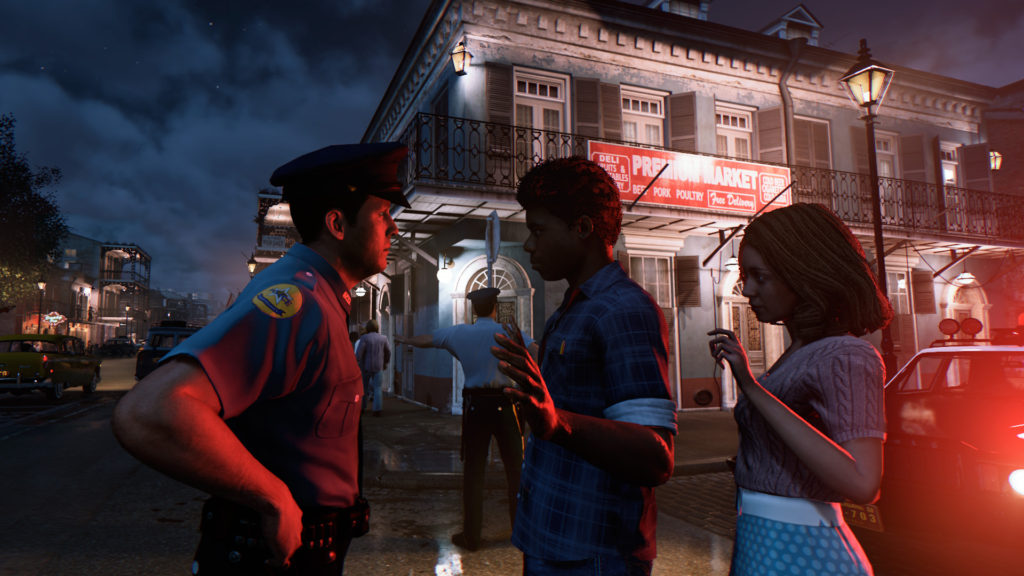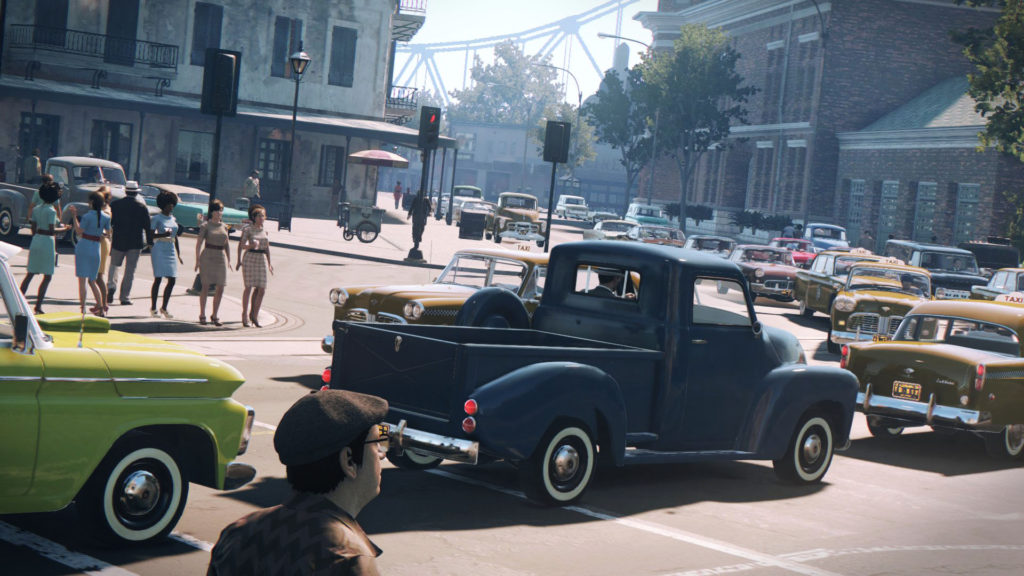Mafia 3 by 2K was released yesterday, the first reviews are only a few days away. The third adventure about criminality, breaking free and outstanding good music might or might not live up to its expectations. One of them is that the game offers a responsible, realistic and still easily accessible approach on racism.
The game is fictional, but something that highlights its realistic depiction of a city and emphasises realistic graphics, needs to focus on realistic problems as well. For many, escaping reality is a major advantage of video games, which, however, is no excuse for ignoring issues like racism.
Swinging, shooting, segregating sixties
According to published trailers and advertisement, Mafia 3 is fun as is the city of New Bordeaux itself. Caught between utopia and violence, advertisement and reality, the first pictures of Mafia 3 draw a pretty picture of a new, vivid town, that is soaked with criminality, but also ethnic variety. New Bordeaux is supposed to be as realistic as its example, New Orleans. Set in 1968, the game introduces Lincoln Clay, a black veteran, who decides to fight against the city’s Mafia, all the criminal institutions and masterminds.
“After years of combat in Vietnam, Lincoln Clay knows this truth: family isn’t who you’re born with, it’s who you die for. When his surrogate family, the black mob, is betrayed and wiped out by the Italian Mafia, Lincoln builds a new family on the ashes of the old and blazes a path of military-grade revenge and redemption through the Mafioso responsible.” – Plot desription
So far, the depiction of racism has not been mentioned in detail (explanations concerning this topic will be mentioned later). Are characters discriminated, is the game realistic and a reference to actual 60’s America? Does racism play an essential role? In order to answer these questions, we need background knowledge. Mafia 3 takes place in 1968, in the middle of the Civil Rights movement, more than ten years after Rosa Parks refused to give up her seat and during the year in which Martin Luther King was assassinated. Racial segregation was still omnipresent, albeit there were many protests, especially in the South of the United States. In 1965, New Orleans in Louisiana, known for its musical variety, was hit by a hurricane that destroyed the majority of houses and left thousands of people homeless – a base for accusations, stressing discrimination and savage behaviour that can be encouraged. One aspect that indicates how the game deals with racism is the existence of the racist Southern union, that controls one district and cooks PCP. Others include harassment – although the protagonist behaves as normal as one can, police officers become increasingly suspicious, emphasising prejudices and inequality. Actual New Orleans has not been too different in the 1960’s and even up until today there exists this discrimination. Thus, the city is an ideal model for a fictional city that is home to a black video game character.
The fact that Mafia 3 introduces a black protagonist is surprising, yet delightful. The depiction of black characters has been characterised by stereotypes and prejudices, most heroes in video games are still white (and male). Although we do not know, if Lincoln is a hero or a mere product of violence and hate, killing everyone and helping no one, there is hope. Focussing on a black protagonist means focusing on a minority that is equally present in the real life as any other ethnicity (in fact, in 2010 67,25% of New Orleans‘ citizens were African-Americans), but is almost never portrayed in video games.
Representing a 1960’s New Orleans cannot be done without at least hinting at racial discrimination. But why is it important for a game, that is supposed to be fun and relaxing, maybe exciting, to mention something as racism that reminds players brutally of “real world” issues?
Can games act as the voice of societal issues?
Games have become a popular medium, that is accessible for many and that combines participation and mediation. These characteristics make games so appealing, so versatile. With such power and range comes responsibility. On one hand, buzzwords like addiction prevention, critical handling with what is consumed and reflecting on it cause alert for outsiders, who have not come into contact with the medium yet. On the other hand, these factors are crucial when it comes to media literacy; off boring lectures and know-it-all exhortations, there are creative and original methods to convey this knowledge. Games can not only entertain millions, but also inform, forge opinions and be thought-provoking instruments. Part of this is the reasonable and responsible examination with serious subjects. Gender inequality and war are increasingly addressed, but this is only the beginning of what our world has to offer.
Is a game responsible for using its powers and range to draw attention to not only the historical extent of racism, but its actual state nowadays? Games are predestined for showing the audiences that there are consequences, that there are always different sides to a story and things are often arbitrary. Their nature forces players to take action, to be part of the plot. How we treat people often matters in games and influences our dialogue options or possible outcome of a quest. Furthermore, games emphasise features like player’s agency and ludonarrative excellence. So why not use this power to stress problems that are not necessarily restricted to the virtual world?
Henceforth, Mafia 3 is able to incorporate topics like racism and discrimination. They are important topics of our lives; considering the historical context of the game’s setting and the mentioned game mechanics, Mafia 3 might help to realise the importance of equality. It can confront people, who generally avoid the topic, regardless whether they do it voluntarily or not. Especially regarding the context in which the game is published, it is crucial to address racism, police brutality and discrimination. Mafia 3 might not intend to refer to recent events, the fact that people draw the line between current events and the game, however, demonstrates its significance. Games have become a considerable medium of our time and can or should respond to, for instance, racism.
Using gameplay and creating an elaborate story in order to subtly refer to racism
Approaching topics like racism does not need to be deterrent. There are many subtle ways in which a game can make players reflect on their behaviour or draw attention to the way they treat other people. As for instance, influencing the outcome of a quest or the story by choosing certain options can (or should) lead to more severe consequences.
Mafia 3 will face racism. It is said to include racial friction, characters being more hostile towards blacks than towards others, creating a distinct uneasiness and discomfort. It is said to focus on the consequences of crime – the players learn that people get hurt and that there are repercussions, not only immediate ones that only affect the person, who has acted, but others as well, sometimes some time later. This kind of reflected acting is developing in games and it is about time that we transfer this epiphany to the real world.
As explained earlier, there is not much evidence as to how Mafia 3 deals with racism – apart from the obvious context due to the time and place and the black protagonist. One major source of information regarding this, admittedly delicate topic, is a conversation between Vice’s Austin Wallet and Charles Webb, Senior Writer of Mafia 3.
“We want to respect the period, but we also wanted to tell a story that’s, like you said, pulpy and engaging in a way that felt true to Mafia as a game series. […] What happens when the devaluation of black lives—the devaluation of an entire people—intersects with crime?”
What really matters…
To conclude, racism is still an issue. There is discrimination and hatred, people blaming others because they look different, have different beliefs, or a different culture. This problem is not excluded to the United States, it is a worldwide problem. It has been there for as long people discovered these differences and it will not disappear by being ignored. Communication and clarification should be emphasised and games can be part of this process as they reach many and show consequences like no other media.
In the end it almost doesn’t matter how good or bad Mafia 3 actually is. The game becomes negligible in the light of recent events and the importance of a video game that tackles racism. It almost doesn’t matter how the game portrays this topic – I have faith in the developers, though – and the fact that it is referred to at all is as significant as rare – unfortunately. Sure, not including an explicit political statement is a political statement as well, but how often did you encounter a game that made you think about racism?
Mafia 3 might offer an exceptionally well-written story, really bad graphics, ordinary gameplay (I can only rely on reports until I played the game myself), its real advantage is the courage and naturalness with which it tackles racism.
